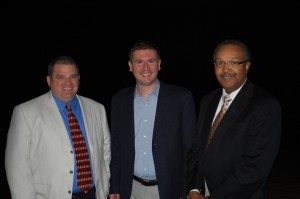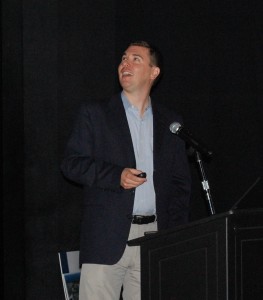NSU Newsroom
SharkBytes
Horizons
This version of NSU News has been archived as of February 28, 2019. To search through archived articles, visit nova.edu/search. To access the new version of NSU News, visit news.nova.edu.
This version of SharkBytes has been archived as of February 28, 2019. To search through archived articles, visit nova.edu/search. To access the new version of SharkBytes, visit sharkbytes.nova.edu.
“Virtual” Property Rights, “Real” Lawsuits, and a “Free” Pair of Diamond Eyelashes
More than 100 law students, faculty and staff, and others interested in the burgeoning world of virtual law came to the University Center’s Performance Theater on Feb. 28 to hear Facebook attorney Benjamin Duranske, J.D., detail the myriad aspects of Internet law. Duranske, who attended NSU’s Law Center for a year before transferring to UC Berkley, has long been interested in virtual worlds and their real-world legal applicability.
As the founder of the Second Life Bar Association, Duranske routinely holds virtual meetings with other attorneys in the virtual world “Second Life.” He even offered CLE for one class taught in the schisms of their servers… somewhere in California. However, he came to NSU in person to talk about recent lawsuits and the $7 billion in goods that were sold in virtual worlds in 2010.
There are people who are literally making a living, supporting their families, buying and selling land and commerce in virtual worlds. One such person, a friend of Duranske’s, earned over $800,000 in just one year selling dresses and other clothing items in her virtual store. Another storefront offers a free pair of diamond-studded eyelashes “with purchase.”
There are many possible uses for such technology – above and beyond the gaming/fun component – such as brand marketing, education and training. The U.S. Army is using the technology to run simulations, and these virtual worlds have hit the FBI and IRS’ radar screens leading to a crack-down on virtual gambling, and investigations into possible tax liabilities (particularly when “real” goods are exchanging hands in the “real” world). The C.I.A., in conjunction with other government agencies, even ran a think tank on terrorism and how virtual worlds can be studied to determine how people group together. The applications are seemingly endless, but the technology is still less than friendly to the average user.

Eric Young, J.D., Assistant Dean for the Law Library and Information Technology Center and Assistant Professor of Law; Benjamin Duranske, J.D., Facebook Payments Counsel; and Athornia Steele, J.D., Dean of the Shepard Broad Law Center.
Among the multitude of legal issues includes right of publicity for public figures whose likenesses are being virtually stolen and sold, including deceased ones. Another issue could arise with companies, such as Nike, who are wholly absent in virtual worlds, but people are running Nike stores. Copyrights, trademarks, and company infringement issues abound and are yet untested in the courts for the most part. And all of that does not include labor laws – some virtual companies employ actual human employees. So how do you know you’re not violating child labor laws or minimum wage requirements by paying that avatar $1.00 an hour to be a greeter at your storefront? The reality is that you don’t. This new frontier is rapidly changing, and law will play an integral part in its future.
If you’re interested in learning more about virtual law, look up an archive of articles on Duranske’s blog, Virtually Blind: http://virtuallyblind.com/
